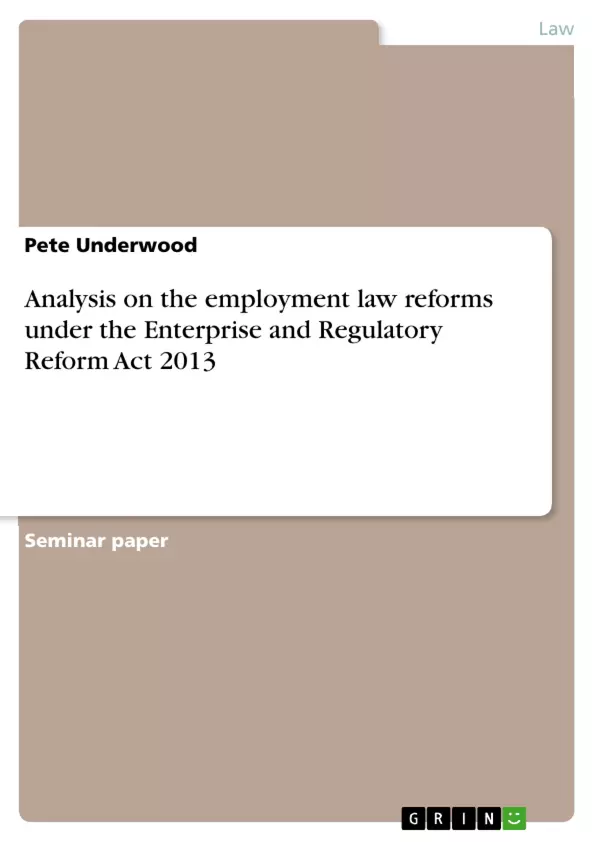This report aims to provide an analysis on some of the employment law reforms under the Enterprise and Regulatory Reform Act 2013. The coalition government have implemented some substantial changes that have affected the way in which employment law works in practice. The changes reviewed are; the change in qualifying dismissal, the introduction of tribunal fees, ACAS mandatory conciliation and pre-termination negotiation. Methods of analysis include, obtaining information from the department for business and industry and ACAS comparing the amendments in the law with figures from the office of national statistics with a view to establishing a correlation between the reforms and the employment statistics. This report also focuses on comments from secretaries of state and legal commentators to compare the differing viewpoints and establish the potential effect against intended impacts. Results of the analysis into the reforms show that there is almost certainly an infringement on basic workers’ rights. The infringements come in the form of increasing qualifying periods, introduction of tribunal fees and adding additional steps for potential claimants to complete before they can bring any claim against an employer. Commentators describe the reforms as attacks and ask questions as to access to justice. The reforms have even prompted a large employment union to bring a judicial review case against the government. This report concludes that whilst there is the potential for these reforms to have a significant detrimental effect to employees and workers individually, overall on a collective basis the benefit has greater potential to increase employment rates. The implementation of the changes has reduced the fear factor and perceived risk of hiring employees and can be seen to a raise employment statistics and have a more flexible working environment leading to a better employment relationship between employer and employee.
Table of Contents
- Executive Summary
- Introduction
- Report
- The Current Economic Climate
- Reforms under the latest government
- Introduction of tribunal Fees
- Change in qualifying Periods for employee claims in Unfair Dismissal.
- ACAS conciliation
- Pre-Termination Negotiations.
- Conclusions on the changes.........
- Bibliography
Objectives and Key Themes
This report aims to analyze some of the employment law reforms introduced under the Enterprise and Regulatory Reform Act 2013. It examines the impact of these changes on the employee-employer relationship and their potential effects on overall employment rates.
- Impact of recent employment law reforms on employee rights
- Analysis of the correlation between reforms and employment statistics
- Evaluation of the intended and actual effects of the reforms
- Assessment of the potential infringement on basic workers' rights
- Discussion on the potential impact of reforms on access to justice
Chapter Summaries
- Executive Summary: This chapter provides an overview of the report's objectives, methodology, and key findings. It highlights the reforms under review, including changes to qualifying periods, tribunal fees, ACAS conciliation, and pre-termination negotiations.
- Introduction: This chapter introduces the context for the report, outlining the recent economic climate and its impact on employment law. It sets the stage for examining the reforms within this broader context.
- Report: This chapter delves into the details of the employment law reforms implemented under the Enterprise and Regulatory Reform Act 2013. It focuses on the specific changes made to qualifying periods for unfair dismissal claims, the introduction of tribunal fees, ACAS mandatory conciliation, and pre-termination negotiations.
Keywords
The key terms and concepts explored in this report include employment law reforms, Enterprise and Regulatory Reform Act 2013, employee rights, qualifying periods, tribunal fees, ACAS conciliation, pre-termination negotiations, access to justice, and employment statistics.
Frequently Asked Questions
What is the Enterprise and Regulatory Reform Act 2013?
It is a UK law that introduced significant reforms to employment law, aimed at reducing the burden on employers and increasing labor market flexibility.
What were the main changes to unfair dismissal claims?
The Act changed the qualifying periods required for employees to bring a claim for unfair dismissal against their employer.
How did the Act affect access to justice for workers?
The introduction of tribunal fees and mandatory ACAS conciliation added extra steps and costs, which critics argue infringe on basic workers' rights.
What are pre-termination negotiations?
These are confidential discussions between an employer and employee about ending employment, which cannot generally be used as evidence in tribunal cases.
Did the reforms increase employment rates?
The report concludes that while detrimental to individual employees, the reforms may have reduced the "fear factor" of hiring, potentially raising overall employment statistics.
- Arbeit zitieren
- Pete Underwood (Autor:in), 2014, Analysis on the employment law reforms under the Enterprise and Regulatory Reform Act 2013, München, GRIN Verlag, https://www.grin.com/document/294225



